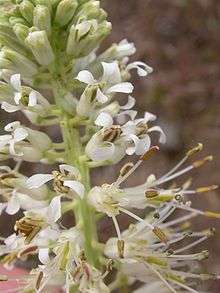Thelypodium milleflorum
| Thelypodium milleflorum | |
|---|---|
 | |
| Scientific classification | |
| Kingdom: | Plantae |
| (unranked): | Angiosperms |
| (unranked): | Eudicots |
| (unranked): | Rosids |
| Order: | Brassicales |
| Family: | Brassicaceae |
| Genus: | Thelypodium |
| Species: | T. milleflorum |
| Binomial name | |
| Thelypodium milleflorum A.Nelson | |
Thelypodium milleflorum is a species of flowering plant in the mustard family known by the common names manyflower thelypody[1] and many-flowered thelypodium. It is native to western North America, particularly the Great Basin and surrounding plateau, desert, and foothill habitat, where it grows in sagebrush and scrub.
Description
Thelypodium milleflorum is a biennial herb producing many erect stems, often approaching two meters in height. The stems are hairless, sometimes hollow and inflated, and often waxy in texture. The basal leaves have oblong to lance-shaped blades with toothed edges, and sometimes divided into segments.
The large inflorescence is a dense, spikelike raceme of mustardlike flowers with white petals. The fruit is a narrow, flat silique up to 8 to 10 centimeters long.
References
- ↑ "Thelypodium milleflorum". Natural Resources Conservation Service PLANTS Database. USDA. Retrieved 9 December 2015.
External links
- Jepson Manual Treatment: Thelypodium milleflorum
- Flora of North America
- Washington Burke Museum
- Thelypodium milleflorum - U.C. Photo gallery